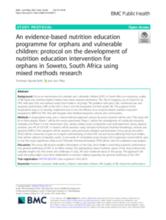Abstract
Background: Focus on interventions for orphans and vulnerable children (OVC) in South Africa on education, quality of life (QoL) and nutrition-related matters have been reported diminutive. The risk of dropping out of school for an OVC with poor QoL and without varied food intake is very high. The problem with poor; QoL, nutritional care and academic performance (AP) of the OVC is that it sets the foundation for their adults’ life. The purpose of this longitudinal study is to develop, implement and to test the efficacy of an evidence-based nutrition education programme (NEP) for OVC that will integrate their families/caregivers, schools and communities.
Methods: A longitudinal study, and a mixed-methods approach steered by action research will be used. This study will be in three phases. Phase 1 will be the needs assessment; Phase 2 will be the development of nutritional education materials, and Phase 3 is the intervention. QoL, dietary intakes, body composition, and anthropometric status, physical activities, and AP of 520 OVC in Soweto will be assessed using standard techniques. Nutrition knowledge, attitude and practices (KAP) of the caregivers will be assessed using previously validated questionnaires. Focus group discussion (FGD) will be conducted to gain an in-depth understanding of what OVC eat and factors affecting their food intakes. Data will be collected at baseline, week 12 and week 24. Generalised Least Squares (GLS) regression model will be used to test the study hypotheses. Atlas-ti and Thematic Framework Analysis (TFA) will be used for qualitative data analysis.
Discussion: This study will provide detailed information on the QoL, food intakes concerning academic performance and general well-being of OVC in an Africa setting. The participatory mixed methods nature of the study will provide valuable insights into the drivers and challenges to QoL, AP, and nutritional status of this group. This approach will assist the policymakers’ and other stakeholders in decision making regarding the general well-being of the OVC.
View article here.

